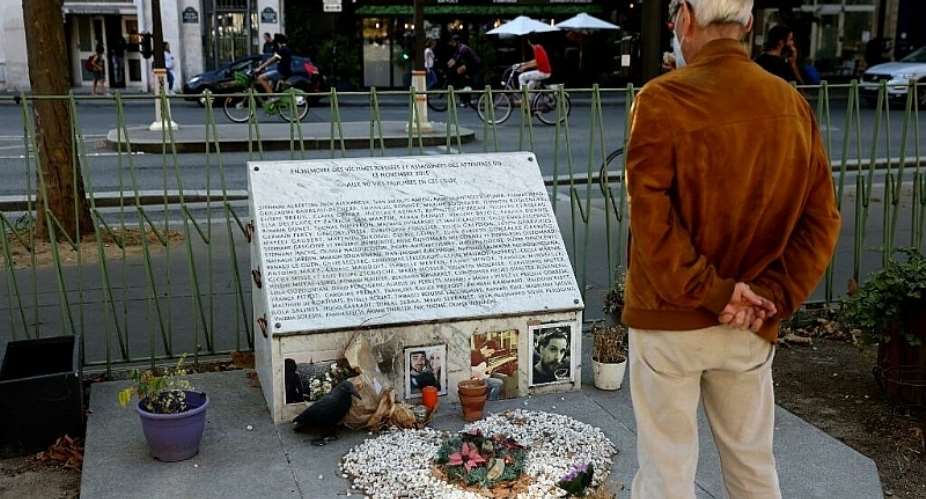Testimony from bereaved families continues before the special criminal court in Paris, where 20 men are being tried on suspicion of involvement in the November 2015 massacre of 130 people in the French capital.
"The suffering is a relentless part of my life," a woman who lost her 26-year-old son at the Bataclan told the court. "Sleeping is suffering, walking is suffering, speaking, working, breathing is suffering. The pain comes back every day."
A father described himself as orphaned by the death of his son.
Two fathers of only children, lovers who were 22 and 23 years old when they were murdered on 13 November 2015, stood side-by-side and testified to their illogical status as childless parents.
Repeatedly, we heard the flat refusal of forgiveness for the killers.
"No hatred, but no pardon either. Let justice do its work."
"The killers took everything, an adored and adorable daughter, the grand-children we will never have. God may forgive, but we will not."
More humanity
There was anger too against the cold incompetence of the Legal-Medical Institute where the bodies were brought for final identification and autopsy.
Not for the first time, Monday's witnesses reminded the court that the requirements of forensic medicine can not be reconciled with the need of the families to spend time with their dead. There could have been fewer formalities. And more humanity.
A bereaved father thanked the police who are such a reassuring presence in and around the court building in central Paris, where the trial is taking place. But he had hard words for those who were responsible for public security at the time of the attacks.
"How was such a thing allowed to happen?" he wept.
"There had been warnings from so many people. François Mollins, the top investigating judge in Paris, the anti-terrorist lawyer Marc Trévidic. They knew. They just didn't know enough.
"There were soldiers on duty from the Sentinelle mission, supposed to protect us from terrorists, just outside the Bataclan. Why were they refused permission to act?
"It happened nine months after the killings at Charlie Hebdo. It seems we learned nothing at all."
And there was a man who lost a sister and brother-in-law, a deeply troubled personality driven mad by the sight of his grieving parents, beyond his help.
"It's not easy to watch your father crying over a photo of your dead sister, and not be able to do anything."
He described his anger at the parade of political figures . . . François Hollande, Manuel Valls, Bernard Cazeneuve, respectively President, Prime Minister and Interior Minister . . . at the first anniversary of the killings.
"They were strutting around, the representatives of a state that had ignored our ruined family for a year."
He lost his job, he lost himself in alcohol.
'French justice is too good'
It took a nasty scene in a bar to make him realise how much he needed help.
"At our first meeting, the psychiatrist was afraid of me, as well as afraid for me."
The medication helps. "But I'm still totally lost, emotionally unstable. I do everything mechanically. I don't like this society.
"French justice is too good for the killers and th





 EOCO returns fire at OSP over Cecilia Abena Dapaah’s money laundering case
EOCO returns fire at OSP over Cecilia Abena Dapaah’s money laundering case
 Anti-corruption endeavours must be rooted in systems, investigations and prosecu...
Anti-corruption endeavours must be rooted in systems, investigations and prosecu...
 We’ve not introduced 1% cybersecurity levy on banking transactions – BoG
We’ve not introduced 1% cybersecurity levy on banking transactions – BoG
 ‘Be calm; we’re having engagements on new fee implementation’ — KNUST SRC assure...
‘Be calm; we’re having engagements on new fee implementation’ — KNUST SRC assure...
 ‘Mahama not pleased with my work because I defeated him twice’ — Akufo-Addo
‘Mahama not pleased with my work because I defeated him twice’ — Akufo-Addo
 ‘I’ll control government spending when elected President’ — Bawumia
‘I’ll control government spending when elected President’ — Bawumia
 Bawumia is compassionate, unique politician without corruption tag — Miracles Ab...
Bawumia is compassionate, unique politician without corruption tag — Miracles Ab...
 2024 elections: Elect a new leader if Bawumia doesn't deliver in his first term ...
2024 elections: Elect a new leader if Bawumia doesn't deliver in his first term ...
 2024 elections: Let Aduomi be if he won't return; just work hard — Prof. Osafo t...
2024 elections: Let Aduomi be if he won't return; just work hard — Prof. Osafo t...
 Multinational companies exiting Ghana worrying; it'll lead to job losses, deter ...
Multinational companies exiting Ghana worrying; it'll lead to job losses, deter ...
